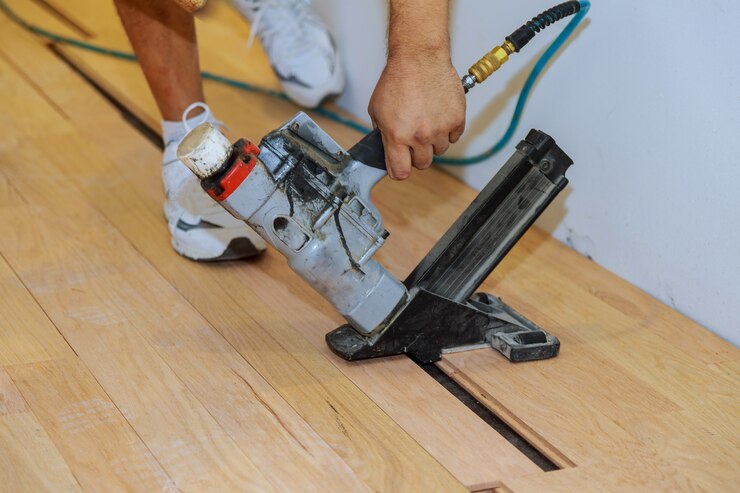Commercial spaces demand flooring solutions that balance aesthetics, durability, and functionality. From office complexes and retail stores to healthcare facilities and educational institutions, the right flooring installation service can elevate the look and performance of your space while ensuring long-term value. In this comprehensive guide, we’ll explore everything you need to know about commercial flooring installation, including benefits, types, processes, and expert tips for achieving the best results.
Why Invest in Professional Commercial Flooring Installation?
Flooring plays a crucial role in the overall success of a commercial space. Here are some reasons why hiring professional installation services is essential:
- Enhanced Durability: Commercial floors endure heavy foot traffic, equipment movement, and regular wear and tear. Proper installation ensures your floors withstand these challenges.
- Aesthetic Appeal: Professionals ensure precision and attention to detail, delivering a flawless finish that aligns with your branding and interior design.
- Cost Efficiency: While DIY installation may seem cost-effective, professional services prevent costly mistakes, premature replacements, and future repairs.
- Safety Compliance: Properly installed flooring reduces the risk of accidents, ensuring your space complies with safety regulations and building codes.
- Time-Saving: Experts complete projects efficiently, minimizing downtime and ensuring your business operations remain uninterrupted.
Types of Commercial Flooring: Choosing the Right Fit
Selecting the right flooring material is a critical step in any commercial project. Here are some popular options:
1. Luxury Vinyl Flooring (LVF)
- Features: Waterproof, durable, and available in a wide range of designs.
- Ideal For: Retail stores, restaurants, and healthcare facilities.
- Advantages: Low maintenance, cost-effective, and aesthetically versatile.
2. Carpet Tiles
- Features: Modular design, sound absorption, and ease of replacement.
- Ideal For: Office spaces, coworking hubs, and educational institutions.
- Advantages: Customizable patterns and colors, excellent acoustic properties.
3. Hardwood Flooring
- Features: Timeless appeal, eco-friendly, and highly durable.
- Ideal For: High-end retail spaces and executive offices.
- Advantages: Long lifespan and an upscale appearance.
4. Laminate Flooring
- Features: Budget-friendly, scratch-resistant, and available in wood-like finishes.
- Ideal For: Cafés, showrooms, and small retail stores.
- Advantages: Easy installation, suitable for high-traffic areas.
5. Ceramic and Porcelain Tiles
- Features: Water-resistant, durable, and available in various textures.
- Ideal For: Bathrooms, kitchens, and hospitality areas.
- Advantages: Low maintenance, excellent longevity, and versatile designs.
6. Epoxy Flooring
- Features: Seamless finish, chemical resistance, and easy cleaning.
- Ideal For: Industrial spaces, warehouses, and laboratories.
- Advantages: High durability, slip resistance, and attractive finishes.
Steps Involved in Commercial Flooring Installation
A successful flooring installation requires meticulous planning and execution. Here’s a step-by-step breakdown of the process:
1. Consultation and Site Assessment
- Conduct a detailed site inspection to understand space requirements, traffic patterns, and environmental conditions.
- Discuss client needs, preferences, and budget constraints.
2. Material Selection
- Recommend suitable flooring options based on functionality, design, and durability.
- Provide samples and assist in finalizing the material.
3. Subfloor Preparation
- Inspect the subfloor for irregularities, moisture, or damage.
- Level, clean, and repair the subfloor to ensure a stable base for installation.
4. Flooring Installation
- Use advanced tools and techniques for precise placement of flooring materials.
- Adhere to manufacturer guidelines to ensure warranty compliance.
5. Finishing Touches
- Apply sealing, trim installation, and other finishing elements.
- Conduct a thorough quality check to ensure the flooring meets standards.
6. Post-Installation Maintenance Guidance
- Provide maintenance tips and schedules to prolong the flooring’s lifespan.
- Offer follow-up services for repairs or refinishing if needed.
Key Considerations for Commercial Flooring Projects
When planning a commercial flooring project, keep these factors in mind:
1. Traffic Patterns
- Assess foot traffic levels to determine durability requirements.
2. Acoustic Needs
- Prioritize sound-absorbing materials in offices, hotels, or educational settings.
3. Safety Features
- Opt for slip-resistant and fire-retardant flooring for added safety.
4. Environmental Impact
- Consider eco-friendly materials like bamboo, cork, or reclaimed wood.
5. Budget Allocation
- Balance quality and cost to achieve optimal value.
Benefits of Partnering with Professional Flooring Installers
Professional flooring installers bring expertise and resources that ensure project success. Here are some key benefits:
- Access to High-Quality Materials: Professionals have access to a wide range of premium materials and tools.
- Custom Design Options: Tailored solutions that match your branding and interior design goals.
- Warranty and Support: Reliable installers offer warranties and ongoing support for their work.
- Efficiency and Precision: Trained teams complete projects on time with minimal disruption.
Common Challenges in Commercial Flooring Installation
1. Moisture Issues
- Solution: Use moisture-resistant materials and perform thorough subfloor preparation.
2. Inconsistent Subfloors
- Solution: Level and repair subfloors to prevent uneven installations.
3. Incorrect Material Choice
- Solution: Consult professionals to choose materials suited to the space’s purpose and traffic levels.
Tips for Maintaining Commercial Flooring
- Regular Cleaning: Establish a cleaning schedule to prevent dirt buildup.
- Preventative Measures: Use mats at entry points to reduce wear and tear.
- Prompt Repairs: Address cracks, chips, or damages promptly to avoid further issues.
- Professional Maintenance: Schedule periodic inspections and refinishing services.
Conclusion: Transform Your Space with Expert Flooring Solutions
Commercial flooring installation is a vital investment that influences the functionality, safety, and aesthetic appeal of your space. By partnering with experienced professionals and selecting the right materials, you can ensure long-lasting results that enhance your business environment. Whether you’re upgrading an office or designing a new retail outlet, expert flooring services can help you achieve the perfect blend of style and durability.
